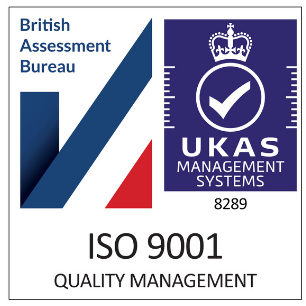
The UK Asbestos Training Association (UKATA) successfully achieved re certification of ISO:9001 in 2023.
ISO 9001 sets out the criteria for a quality management system and is the only standard in the family that can be certified to (although this is not a requirement). It can be used by any organisation, large or small, regardless of its field of activity. In fact, there are over one million companies and organisations in over 170 countries certified to ISO 9001.
To achieve this standard, an organisation must prove their internal quality systems and procedures follow strict guidelines, thus ensuring the ability to consistently provide products and services that meet the needs of their customers and other relevant stakeholders.
This standard is based on several quality management principles including a strong customer focus, the motivation and implication of top management, the process approach and continual improvement. These principles are explained in more detail in ISO’s quality management principles.
Using ISO 9001 helps ensure that customers receive consistent, good-quality products and services, which in turn brings many business benefits.
Implementing a quality management system helps:
- Assess the overall context of your organisation to define who is affected by your work and what they expect from you. This will enable you to clearly state your objectives and identify new business opportunities.
- Put your customers first, making sure you consistently meet their needs and enhance their satisfaction. This can lead to more repeat custom, new clients, and increased business for your organisation.
- Work in a more efficient way as all your processes will be aligned and understood by everyone in the business or organisation. This increases productivity and efficiency, bringing internal costs down.
- Meet the necessary statutory and regulatory requirements.
- Expand into new markets, as some sectors and clients require ISO 9001 before doing business.
- Identify and address the risks associated with your organisation.
UKATA initially achieved ISO 9001:2015 in July 2019, with a clean report at both stages of audit. To retain the certification, surveillance audits are carried out annually and a reassessment audit conducted every three years. The auditor reviews documents and records to ensure the company has adhered to the system and is following procedures.
Speaking of the renewal, UKATA’s Quality Assurance Manager, Liam Pembleton said “I am extremely proud to announce that UKATA has renewed IS0:9001 in 2023, after initially securing the certification in 2019. This re certification reflects the consistent effort the whole team at UKATA put into ensuring the organisation complies with the standards.
UKATA is dedicated to improving the quality and standards of asbestos training, with the goal of protecting workers and the public from the risks associated with asbestos exposure, by using the Quality Management Systems which are in place within the organisation, the team can continue to successfully deliver award winning services”.
Liam Pembleton joined UKATA in November 2020 as the Quality Assurance Manager. Liam is responsible for auditing quality systems, processes, procedures, communications, documents, and policies on behalf of the association.
UKATA, a leading association, is dedicated to enhancing the quality and standards of asbestos training with the aim to shield workers and the public from the hazards of asbestos exposure.
The association collaborates closely with its members to guarantee that they have access to the latest information, training resources, and industry updates. They provide a suite of support services to assist them in accomplishing their training objectives. Their membership encompasses a diverse array of organisations involved in asbestos training, including training providers, asbestos removal contractors, consultants, and equipment suppliers.
UKATA is fervent about promoting safe and responsible working practices, committed to working with members and partners to realise a shared vision of protecting workers and the public from the hazards linked with asbestos exposure.
Published on Tuesday 19th September 2023

